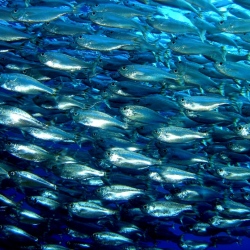
Available data from the Environmental Protection Agency suggests the Great Lakes could be soaking up carbon dioxide in the atmosphere, which could change the pH levels in the water and have a negative impact on wildlife.
Galen McKinley, ocean sciences professor at the University of Wisconsin-Madison, said while data is currently limited, computer projections suggest the Great Lakes’ waters are becoming more acidic due to human carbon emissions. She said a similar process is happening in the open oceans.
According to data from the National Oceanic and Atmospheric Administration, when carbon dioxide in the atmosphere gets absorbed by bodies of water, the ensuing chemical reaction will reduce the pH level in the water. The pH level of a liquid indicates how acidic or basic it is on a 0-14 scale, with water usually measuring at 7 — perfectly neutral. Lowered pH levels should not impact the drinkability of the water in the lake, McKinley said.
McKinley said the open oceans have faced a 30-percent increase in acidity since the Industrial Revolution, and the NOAA estimates that with current carbon emissions, by 2100 the ocean surfaces could be 150 percent more acidic than pre-industrial levels.
McKinley believes the Great Lakes, and smaller inland lakes, could be facing the same issues on a smaller scale. She said Lakes Michigan, Superior and Huron have long residency periods — water tends to stay in the lake for 100-200 years before moving elsewhere in the watershed. She said that means they tend to be in equilibrium with atmospheric carbon dioxide levels.
“If you just think about the chemistry of carbon and water and about what we know about the Great Lakes, they are more or less responsive,” McKinley said. “They are in equilibrium with the atmospheric carbon dioxide, so the carbon dioxide in the water will also increase and the pH will go down, similarly to the oceans.”
Lakes Erie and Ontario have shorter residency periods for water, so McKinley believes atmospheric carbon dioxide should have a lesser impact, but she thinks they will still feel the effects. She added that most of the data researchers have comes from Lakes Superior and Michigan, and data on the other three lakes is more limited.
A lowered pH can also see lowered carbonate ion levels, which could affect ecosystems in the lakes. The carbonate ion is important for the formation of calcium carbonate minerals, which organisms like mussels and oysters use to develop their shells.
The biological impact of a lower pH level is unknown for the Great Lakes specifically, but McKinley said based on the data from the oceans, some species, such as algae, would thrive, while others, such as mussels, would suffer. While that would help with eliminating invasive mussels, McKinley believes the native species will suffer too.
